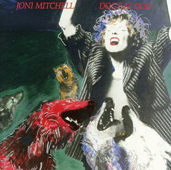But it should be observed that Thomas Dolby takes a bit here on the role of a scapegoat, in so far as having been only one of this production's linchpin. Since at the latter’s helm, are also duly credited Joni Mitchell, Larry Klein and Mike Shipley. However, the album also offers its brilliant share of lyrics and music worth of the pantheon of Joni Mitchell's most beautiful works (Dog Eat Dog, Good Friends, Ethiopia, The Three Great Stimulants and Tax Free -co-written with Larry Klein).
The reality is that Dog Eat Dog suffered in its release from the same problems as its predecessors labeled as "Jazzy". That is, the misunderstanding and rejection of Joni Mitchell's audience -and obviously, of the critics.
The latter, already disoriented and barely recovering from the musician's Jazz explorations, had this time to deal in 1983 with a sharp shift and an unexpected sound excursion within the "Synthpop" which the early 1980’s were so much fond of, and of which Thomas Dolby was one of the Popes. Between Joni Mitchell and the console prodigy, the notorious disputes and frictions over who did what in the team did not help and sealed the fate of an album that would fuel controversy even before being completed : Mitchell would be insisting that she had welcomed Dolby on board only as a "Synth Pop" technical advisor, while himself confirmed that he had been hired as the album’s producer…
However, it was surely a bit naive of Dolby to think that, given that Joni Mitchell was known in 1982 (as before and later), for having always refused to work with a producer. The musician would indeed constantly self-produce her albums after the mishap of her debut, i.e. David Crosby at the helm on Song To A Seagull (1969) for a result she considered as disastrous, which made
(1985)

(2013)
Source: Wikipedia
Photo's author :
© Dan Reily
(July 26, 2013)
Photo used in
"Fair Use" mode
- Photo cropped
and colors damped
for this usage.

(1982)
Source : Youtube
"Live Wireless »
© Solar Music
Rights Management
Usage "Fair Use"
her decide for the sake of her work's integrity to ban producers from her recordings, both by taste and out of necessity.
Therefore, one can legitimately say that Dog Eat Dog suffered from all possible misunderstandings right from the start. Those attributable to gestation (a disagreeing production team). And the postnatal ones as well, with an indifferent, even hostile critical and public reception (except for a few, as always). The effect was devastating on the album’s sales, which thus became somewhat of Joni Mitchell's own "Electro" Mingus, as the album flopped at the Hit Parade.
However, as soon as it came to release, the depth, the intelligence, sincerity and subtlety of analysis, the courage of the comment and the musical sophistication of the album’s title track were noteworthy - especially when expressed by a lone Mitchell on keyboards at a concert following the release of the album. This magnificent interpretation, stripped of any arrangements, forces one to gauge and understand the innate quality of the composition -and by extension of the whole album in its substance, as well as of all its other tracks individually. All of this makes Dog Eat Dog a work objectively misunderstood and grossly underrated, unfairly maligned on its recording release, which time and distance increasingly rehabilitate.
If only because of its prophetic denunciations of the excesses of the Ronald Reagan era which, because of America's cultural influence, infected the entire planet and were magnified under the catastrophic presidency of George W. Bush : Money’s loud talk, violence, warmongering, Justice turned into a cash cow by corrupt lawyers devoid of any scruples and abusing the system in the service of their exclusive interests. State lies.

(1978)
"Freddie Hubbard
Quintet" / Pori
Jazz Festival
(Finlande Juillet 78)
Source: Wikipedia
Author: Kotivalo

Joni Mitchell
(1983)
Source: Pinterest
Imported by Sue
Bernard / AA Folksy
Troubadours &
Croonisters
© Jacques Benoit. Design, works, photographies and texts by Jacques Benoit and under the author’s copyright. Except when derived from other sources and then mentioned as such.
